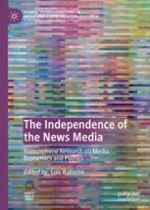2020 | OriginalPaper | Buchkapitel
5. Audiences and Readership of Revolutionary Leftist Media: The “Media Leader” Hypothesis
verfasst von : Vincent Goulet
Erschienen in: The Independence of the News Media
Aktivieren Sie unsere intelligente Suche, um passende Fachinhalte oder Patente zu finden.
Wählen Sie Textabschnitte aus um mit Künstlicher Intelligenz passenden Patente zu finden. powered by
Markieren Sie Textabschnitte, um KI-gestützt weitere passende Inhalte zu finden. powered by
